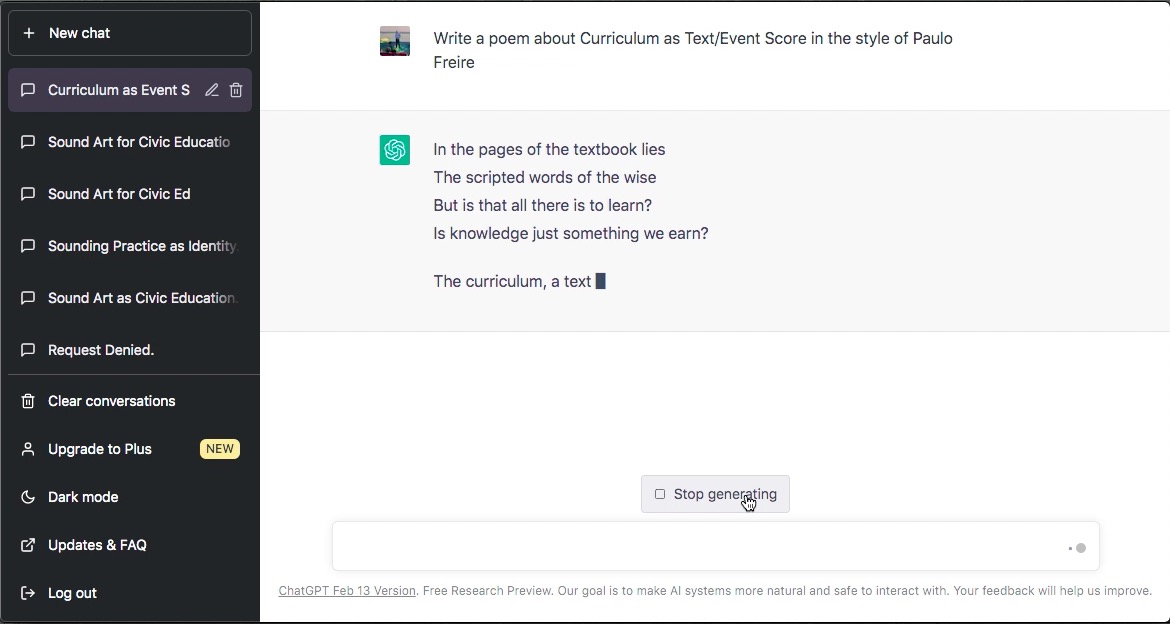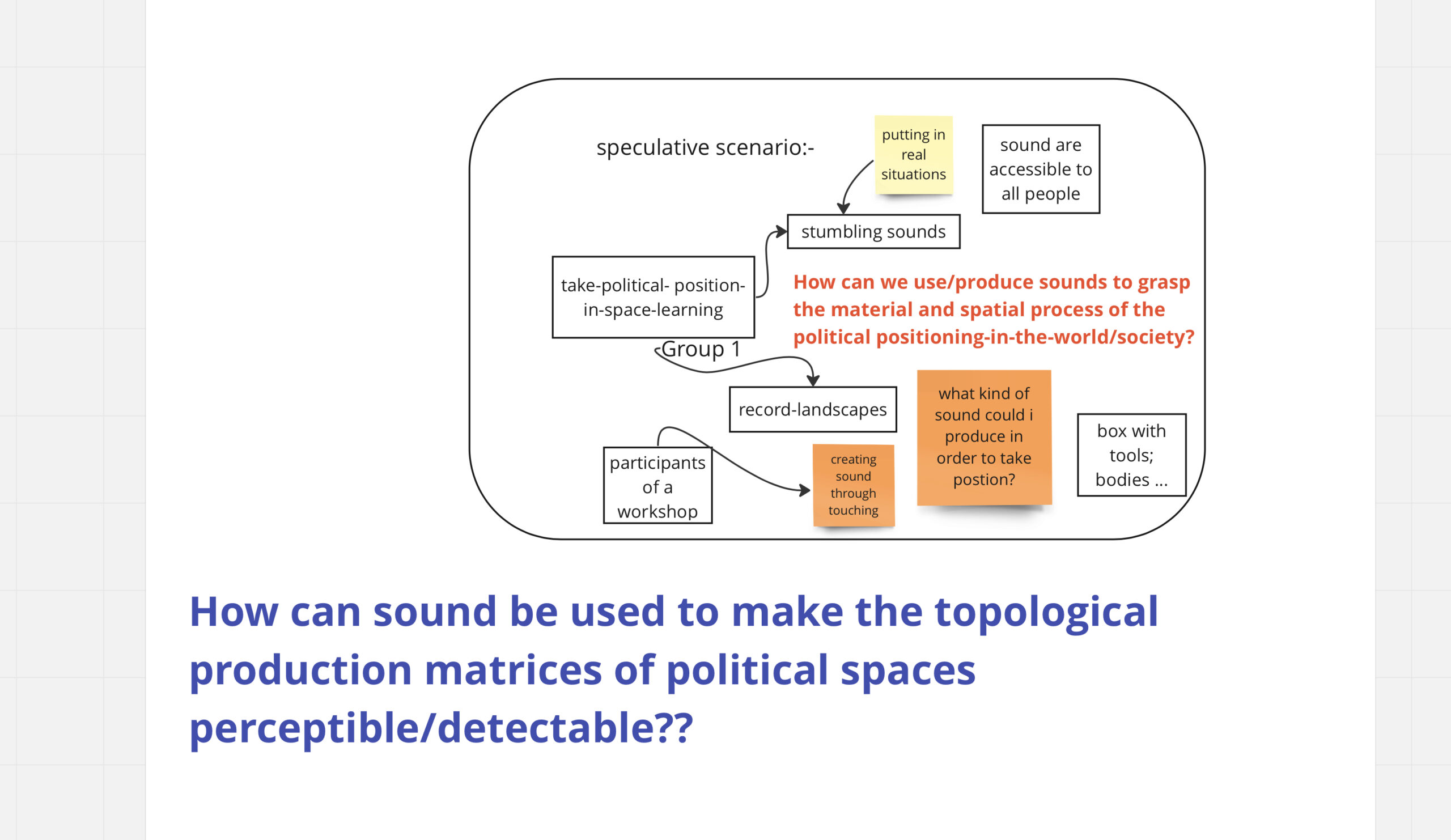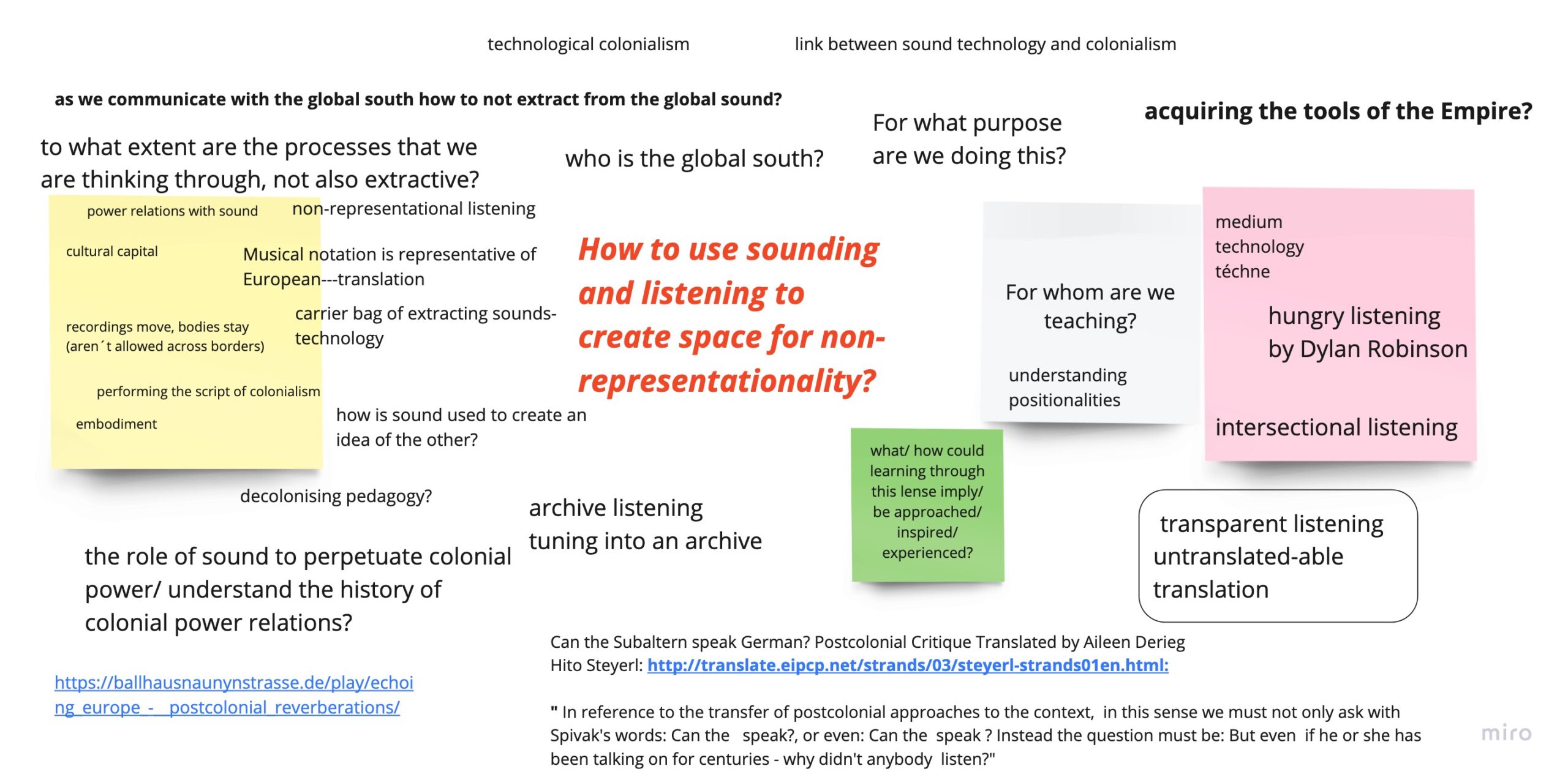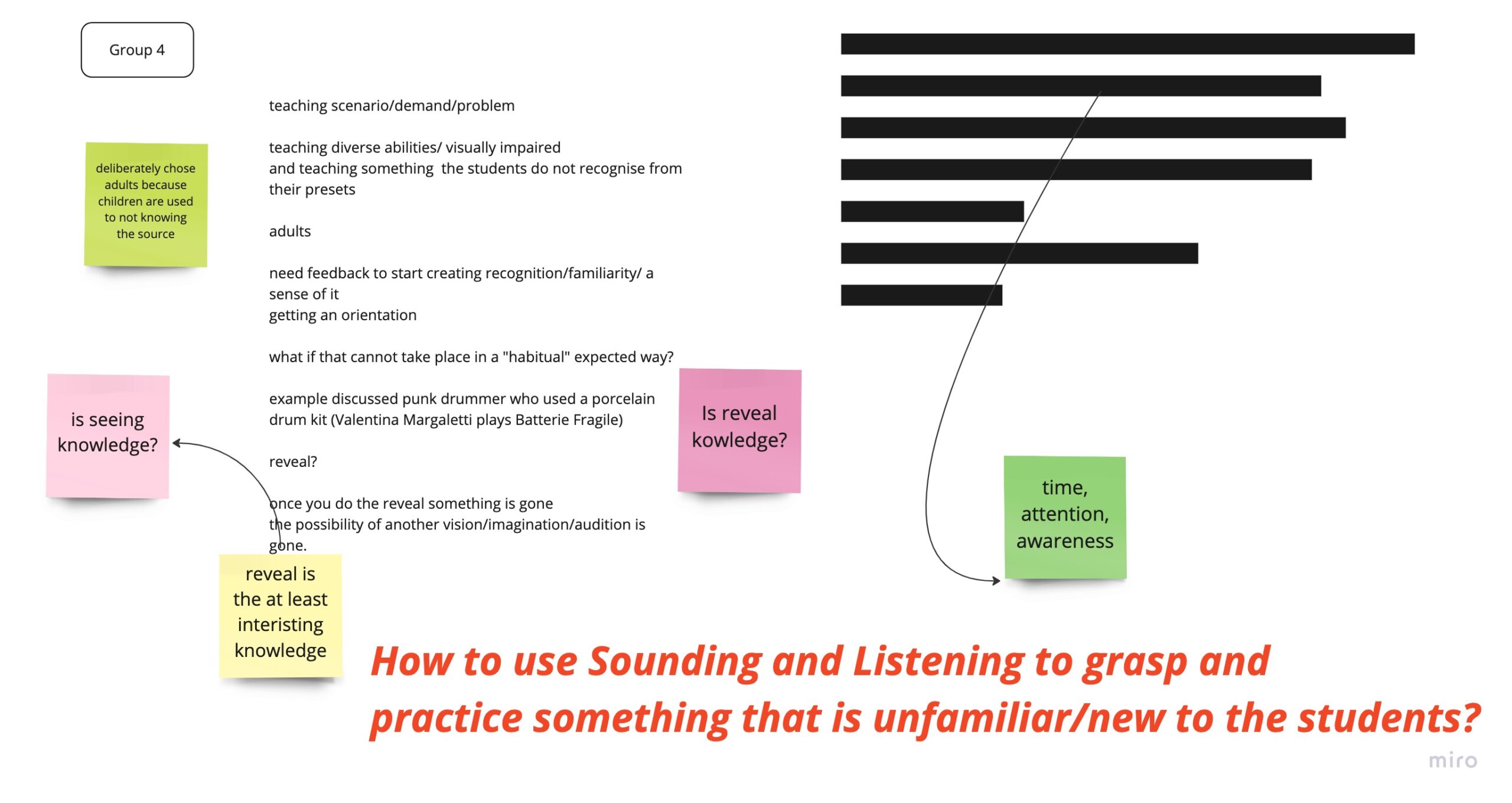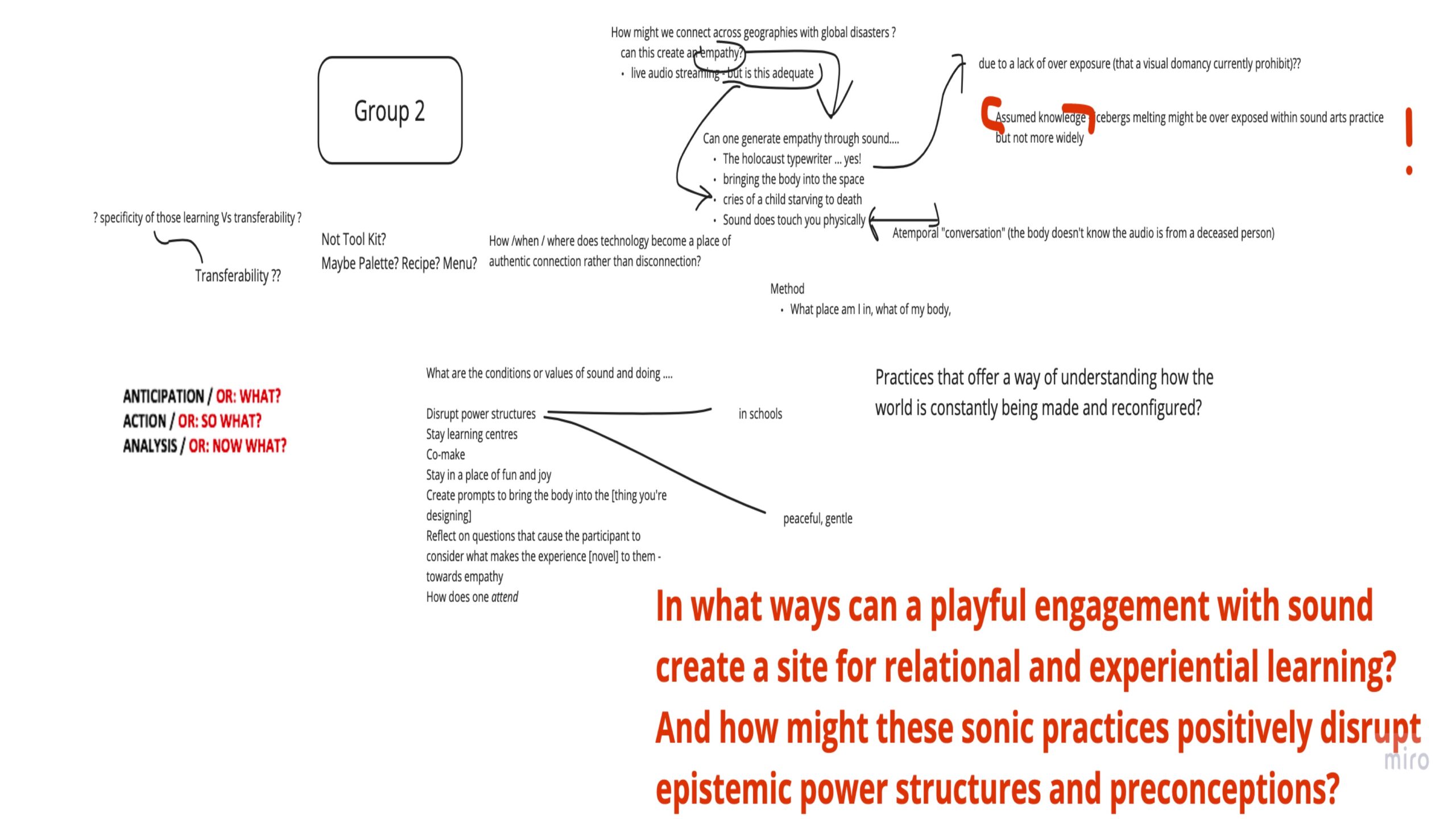Sounding Knowledge: News
Sounding Knowledge Network
AHRC Network Research Project (2022-2023)
Berlin Salon with the Sounding Knowledge Network
On Sunday 16 July 2023, at the Soundgallery 'ohrenhoch, der Geräuschladen' Berlin, the Sounding Knowledge Network team will present the project and a draft Zine produced using the very valuable thoughts and materials that many participants have contributed to during meetings and workshops over the past year.
Please see flyer below for more details.

This is a public event, all are welcome to join us. The exhibition of the Zine and a Sound Work created by Kevin Logan starts at 14:00, the presentation and participatory working starts at 16:00.
The material will be exhibited again on Sunday 23 July from 14:00.
__________________________________________________________________________________________________________________
Dr Kevin Logan presents:
How to Do Things with Sounding Knowledge. Or: Crowdsourcing an Original Contribution to Sonic Pedagogy, at the AR@K23 arts / research / teaching symposium at Kristiania University College, Oslo, Norway (14 & 15 March 2023).
I recently had the privilege of representing the Sounding Knowledge Network project at the AR@K23 symposium in Oslo. The symposium theme was ‘exploring the role of the artist/educator as artistic researcher’ and the focus was on a variety of cross-disciplinary approaches to the production and dissemination of ‘new knowledge’ through practice-based research.
The symposium called for an exploration of a variety of topics including, Methods of artistic teaching and pedagogy; Teaching as performance; The ethics of teaching arts; and Teaching arts across cultural contexts.
The purpose of the international gathering was to examine the diverse practical, epistemological, socio-political, ideological, ethical, and institutional challenges faced by artist educators. In this respect the event was an ideal platform to introduce the aims and objectives of Sonic Pedagogy to a wider academic community and to share and test ideas with peers who are critically engaged with theoretical frameworks for teaching and learning practices.
The symposium had an eclectic mix of contributing practitioners from a host of creative disciplines, Film Makers; Choreographers; Video Game Designers; Musicians and Sound Artists; Fine Arts educators; and Screen Writers, to name a few. This provided an environment for a healthily non-partisan approach to unpicking pedagogic canons.
To address the interesting challenge of representing an in-progress project which has a core team of seven people, I decided that I would not try to do justice to the individual and unique elements that each person is bringing to the research network project. Rather, I would take a somewhat tactical approach to representing the Sounding Knowledge Network using a pincer movement that would hopefully converge towards a richer understanding of the project motivation. For this reason, my presentation was divided into two distinct sections.
Part one, How to Do Things with Sounding Knowledge. Here I introduced the origins and objectives of the research network. I described the online and offline events and workshops, the methodologies, tools, and proposed network outcomes. I spoke of our use of the text/event score as a tool for the exploration of pedagogy as a political practice and suggested that the principle of such methods embodies a democratic intent. The text/event score supposes that the creator(s)/composer(s) of the event relinquishes control to an individual, or individuals, who can do it in their own way. I then presented examples of outcomes from the Aural Literacy Workshops 1 & 2.
In part two, I took a more experimental and playful approach. I briefly discussed my own practice-led research and how this has led me to engage with concepts of Sonic Pedagogy. I outlined why I consider the use of performative practices to be an essential strategy in augmenting the shared goals of the Sounding Knowledge Network.
This forward was followed by three short provocations from which my presentation took the second part of its title. Here I asked the attendees to join me in Crowdsourcing an Original Contribution to Sonic Pedagogy. Each short performative element having a duration of 2 to 4 minutes. The intention being to propagate a collective uncertainty rather than find solutions.
Crowdsourcing ‘an original contribution to knowledge’ is a trope I have used previously in performance presentations and workshops to interrogate the concept of originality, particularly in educational contexts. This implementation of a crowdsourcing methodology has its parallels with the interconnectedness of the Sounding Knowledge Network participatory ethos. To extend the reach of this crowdsourcing beyond the individuals present, I enlisted the aid of a web-based artificial intelligence chatbot.
The first playful provocation involved me asking the chatbot to, “Write a poem about Curriculum as Text/Event Score in the style of Paulo Freire”. Whilst the AI generated poem silently scrolled down the projection screen, I read out a short text I had prepared which discussed how the curriculum functions much like a script or score.
The second provocation took the form of an audience participatory performance. Here I introduced what I called my Pencil Event, this involved the distribution of pencils amongst the attendees, each with a short text score wrapped around it. The scores directed each person to respond to a word or words that would appear in a pre-recorded chatbot generated text. For example, one such score read:
- When you hear or see the words “collective knowledge creation” please pause for a moment, then break this pencil in half.
I then asked the chatbot to, “Write a manifesto for Disruptive Sonic Pedagogy in the style of Yvonne Rainer”. The AI dutifully generate a manifesto, this time with a text-to-speech function sounding out the words as they appeared. This machine voice reading was punctuated by the sound of pencils snapping throughout the lecture theatre as the attendees followed the specifics of their individual scores.
The third and final provocation, or Book Event, also took the form of a participatory performance. Again, enrolling the aid of a chatbot, this time I requested that it, “Write a short presentation about Sound Art Practices as Civic Education in the style of Ivan Illich”. Before launching the chatbot to generate a response, I distributed a handful of paperback copies of the 1971 book Deschooling Society, written by Austrian theologian and philosopher Ivan Illich, that critiques the role and practice of education in the modern world. I asked the attendees to randomly tear a page out of their book and read from it, then pass the book to their neighbour who should do the same…tear, pass and read…tear, pass and read…tear, pass and read.
As the books and pages were distributed and the chorus of readers increased, I gradually added a distortion gain effect to the text-to-speech reading of the chatbot output. This combined human/machine recitation grew in noise and volume to a cacophonous climax at which point I ended the presentation. This was then followed by a short Q&A with myself and the other session presenters.
I am very grateful to Linn Skoglund the chair of the session, to the other presenters Clare Lesser, and Thor Magnus Tangerås and Kjell Ivar Skjerdingstad, for their fascinating contributions, and to Kristiania University College students and staff for their hospitality and generosity.
The AR@K23 symposium presentation can be downloaded (as a pdf without audio-visual content) from here:
https://drive.google.com/file/d/1xH-ScXog4JIPr7dwqpkd00PPzhDoYG1c/view?usp=share_link
__________________________________________________________________________________________________________________
Aural Literacy Workshop 2 – London
On the 9th and 10th of February 2023, the SKN, Sounding Knowledge Network, met in London, to build on the work done in the two online meetings (see here for a list of participants) that had explored and developed educational “positionalities” in relation to sound, as well as during the previous Aural Literacy workshop in Bamberg in December 2022, that had worked with these positionalities in a more applied and developmental mode. The core team (consisting of Salomé Voegelin, Werner Friedrichs, Kevin Logan, Kerstin Meissner, Michael Gallagher, Abigail Hirsch and Timothy Smith) were joined by project participants Paul Nataraj, Irene Revell, Hannah Kemp-Welch, Lisa Hall, Sunil Chandy, Nicol Parkinson, Julia Schauerman, Hector MacInnes, Cannach MacBride, Giada Dalla Bonta, Mark Peter Wright, Holger Schulze, and Jilliene Sellner.
Prior to this London workshop, the core team met several times to consider how the ideas prepared online and tested and developed during the Bamberg workshop might contribute to the articulation and practice of a viable Sonic Pedagogy. In this way they designed the tasks that would enable the workshop participants of this London event to query and develop these ideas towards a critical application. The four speculative scenarios that had been developed online and that were subsequently articulated through the four questions which had provided a conceptual starting point for the work in Bamberg, were re-visited to arrive at four new questions/statements to start the work towards an applied pedagogical toolkit:
- How can sound be used to make the topological production matrices of political spaces perceptible/detectable?
- How to Re/Un-Do 'dominant ideologies of knowing and being’ using Sounding/Listening practices?
- How to use sound to facilitate an ongoing democratic becoming?
- How to use sound to introduce the fragile, uncertain, non-systematised into the visual regime of education.
To frame and guide this work, on the first day of the workshop, Salomé provided a short introduction and context and Kevin gave a presentation on the history of ‘Zines’, clarifying how this DIY, Punk, political activist, etc. format was going to be employed as the means and medium to publish and advocate for a Sonic Pedagogy. This was followed by Kerstin and Werner’s detailed explanation and analysis of ‘Politische Bildung’, which (in its most simplistic terms) is a particularly German discipline and educational subject concerned with political education and political/democratic subjectivity. It finds no exact equivalent in the UK education system and thus provides a vital conjuncture for this bilingual and bi-cultural project.
After this the participants worked in four groups through their respective research questions/statements. By the end of the first day, each group had formulated a work in process toolkit, which they presented to the plenum. The conversations continued well into the evening, over a delicious workshop dinner. The following day, each group handed over their toolkits to a different group, and each was tasked with testing, debating and augmenting these speculative approaches. Shaping them into a viable, usable set of instructions, scores, invitations or lesson plans, etc., that could be used by teachers and students in cross-disciplinary, real-life educational settings.
The SKN team are extremely grateful for the energy and enthusiasm that all participants brought to the workshop. We are excited to take what was achieved to the next stage, which will be the development of a ‘Zine’ to be designed and published in an open access format later this year.
__________________________________________________________________________________________________________________
Aural Literacy Workshop 1 – Bamberg, Germany
In early December 2022, the Sounding Knowledge Network met in Bamberg, Germany for the first of our off-line Aural Literacy Workshops. The core team (consisting of Salomé Voegelin, Werner Friedrichs, Kevin Logan, Kerstin Meissner, Michael Gallagher, Abigail Hirsch and Timothy Smith) were joined by project participants Ingeborg Okkels, Marcus Wachter, Shanti Suki Osman, Selmar Schülein, Steffen Pelzel, Yosa Peit, as well as PhD students from the University of Bamberg, Verena Männer, Julian Schröter, Jana Ziel, Hanna Sophia Kaufmann, Ana Patricia Schultz, Vincent Weikert, Manuel Krauss and Lukas Barth, and Maxim Himmelspach from the University of the Fine Arts Braunschweig.
The workshop participants were tasked with building on the work achieved during two online meetings (see here for a list of participants), which took place in September and October 2022 and explored the practical and theoretical frameworks of sound in education, and education through sound. The first of these online meetings explored 'Positionalities' through an exchange of expertise, methods and tools as well as through presentations and discussion, to find the problems and promises of a Sonic Pedagogy. The second online meeting developed these positionalities through a focus on methodologies of teaching and learning through plenum discussions and breakout sessions, comparing methods, aims, methodologies and finally arriving at four speculative scenarios which subsequently became four questions which provided a conceptual starting point for our work in Bamberg:
- How can we use/produce sounds to grasp the material and spatial process of the political positioning-in-the-world/society?
- In what ways can a playful engagement with sound create a site for relational and experiential learning? And how might these sonic practices positively disrupt epistemic power structures and preconceptions?
- How can we use sounding and listening to create space for non-representationality?
- In what ways can we use Sounding and Listening to grasp and practice something that is unfamiliar/new to the students?
These questions structured and informed our aim to produce a teaching toolkit in Bamberg. The participants split into four groups, each tasked with thinking through their allocated question to create methods and tools for an applied scenario that might generate a Sonic Pedagogic moment . At the end of the first full day we came back together in plenum to present our tentative findings before enjoying a wonderful dinner in the beautiful old town of Bamberg, where less structured but fruitful discussions on sound, education, politics and art continued and networks were strengthened. The following half-day was spent developing these ideas further, with each group attempting to generate concrete text-scores, instructions, methods, tools, and pathways that could be communicated and ultimately transferred across pedagogical scenarios to create cross-disciplinary and applied possibilities for the promotion and testing of Aural Literacy.
These outcomes will be developed, responded to, applied and tested further in the next meeting which will take place in in February 2023 in London, when the core team, adjunct members, together with PhD students from the University of the Arts London and invited experts from Sound, Music, Pedagogy and Education will meet to together work towards the stated aim of the project: to create a Zine as a workbooklet for a Sonic Pedagogy
___________________________________________________________________________________________________
UAL Teaching Conference 2022
The PI, Salomé Voegelin was delighted to be able to present the project at this year’s UAL Teaching Conference which took place on the 11. And 12 July 2022.
This paper with performance element introduces the ‘Sounding Knowledge Network’, an AHRC (Arts and Humanities Research Council UK) funded network project that responds to the visuo-centrism of conventional educational methods and the resulting lack of participative and embodied learning opportunities. The paper part will articulate the motivation and aims of the project, while its performative element will practically speculate on its methods. The objective is to introduce Sonic Pedagogy as a transversal practice that uses embodied, sensory and tacit learning possibilities, which are able to nurture a sensational dimension in education.
The hope is that participants will come, if not to fully understand, then at least to imagine the potential and need for sonic competencies, the skill to engage in a subject/discipline or materiality through the relational capacity of sound, and that they come to appreciate the benefits of a sonic sensibility, the ability to hear one's own position within a plural and interdependent world. The objective is to help the the audience to in their own teaching and learning use sound's invisible and connecting dimensionality and to become able to understand how it might augment their practices, allowing them to include the affective and the sensational in their own educational work.
The Sounding Knowledge conference presentation can be downloaded here.


